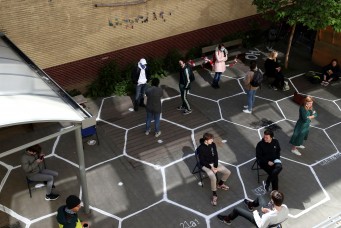The Unnatural World
Will mankind have the ability to prevail in the struggle for a sustainable planet?
The Unnatural World: The Race to Remake Civilization in Earth’s Newest Age. By David Biello. Scribner, New York, 2016. 304 pp.
“Mother Nature seems to be losing the battle to live with her most innovative child.” So begins the chronicle of the Anthropocene by David Biello, the science curator for TED (the ideas-spreading organization that runs TED Talks and other platforms) and a contributing editor to Scientific American. In this whirlwind tour of the battlefronts against climate change, Biello surveys some of the most innovative, idealistic, and frequently frustrated soldiers in that fight, often portrayed as fanatics in the best sense of the term: zealots for ending our self-defeating quest to grind out economic growth on the backs of methods that will make the planet inhospitable if left unchecked.
For the uninitiated, the Anthropocene is a proposed name for our current geological age, one in which humans have an ability to fundamentally reshape nature—specifically through the burning of fossil fuels and land use—that overwhelms nature’s ability to respond or correct. Carbon dioxide is a necessary part of the atmospheric mix of gases, as the greenhouse effect is the sole reason Earth can support life. Too much of it, however, turns the balance from life-affirming to life-threatening. The past three years have been the warmest since systematic record keeping began in the 1800s. The effects are growing increasingly visible: perennial lows in Arctic sea ice cover, extreme water scarcity across wide swathes of the planet, and accelerating plant and animal species extinction. And our efforts to combat it have, overall, been lackluster, bogged down by concerns about economic costs.
Biello is a fan of the concept of a distinctly human-influenced geologic era. The idea is controversial within geology itself, but has gained wider credibility among scientists and climate change analysts; Biello likes how it conceptualizes the impact of human activity on the planet. If humans have created a new era, it is incumbent on us to ameliorate its effects, lest Mother Nature loses the ability to nurture human beings completely. For decades scientists have warned about the concentrations of carbon dioxide and other greenhouse gases, spewing forth from power plants, cars, and factories. Politicians were much slower to gather together the will to decelerate that trend (reversing it completely is still a couple of decades into the future).
The Unnatural World takes a global approach to understanding mankind’s most truly global problem. The main characters in Biello’s survey are a combination of college students and “mad” scientists, city planners, and renewable energy CEOs. Some figures need no introduction, like Elon Musk, head of tech innovators SpaceX, Tesla, and SolarCity, who stumps for solar power as the answer to our transportation and electricity needs while simultaneously pushing for permanent colonization of the moon in case solar doesn’t work out.
Others are relatively unheralded, though their work could be just as high impact. Ben Novak, a scientist at the University of California, Santa Cruz, is working to bring back the passenger pigeon, a now-extinct migratory bird that Novak became obsessed with in his youth. The pigeon, hunted to extinction to feed a burgeoning American population in the nineteenth century, can only be seen thanks to drawings, photographs, and taxidermy.
With advances in genetics, though, there is at least a theoretical possibility that those extinct animals could be resurrected (a more high-profile effort is also currently underway to bring back the woolly mammoth, a perhaps more majestic creature also eradicated by the spread of the most relentless apex predator: humans). Whether they should or not, a discussion generally reserved for science fiction, may soon become as central to our public debates over science as whether cloning is morally acceptable.
It is hard to say after reading The Unnatural World how optimistic we should be about the ability of mankind to prevail in the struggle for a sustainable planet. The human impulse to bend nature to our will as a matter of convenience is longstanding, from the time we learned to make fire and grow crops. There is very little in current technology that can compete with the heat efficiency per dollar spent on a lump of coal, unless we can coordinate policy to have prices reflect environmental damage. As the book demonstrates, there are a lot of solutions out there, but individual voices screaming into the void appear to be insufficient in the face of a wide swathe of indifference and, in some cases, well-funded active hostility.
To date, despite the efforts of the international community, we do not have a comprehensive roadmap to a new era for mankind’s relationship to nature. In Biello’s telling, the world as we have known it since we moved on from a nomadic lifestyle is ending, but we lack a consensus on how to engineer the new one. It will take technology certainly, including many of those Biello profiles in his book. But it will also take smart policy, which we are arriving at in fits and starts, with the potential for significant backsliding. It will take a new morality, broader than even the one envisioned by Pope Francis’s 2015 encyclical condemning environmental degradation, a morality of sustainability and conservation rather than consumption. That is not something that can be built overnight.
Neil Bhatiya is a former fellow at the Century Foundation. On Twitter: @NeilBhatiya.




